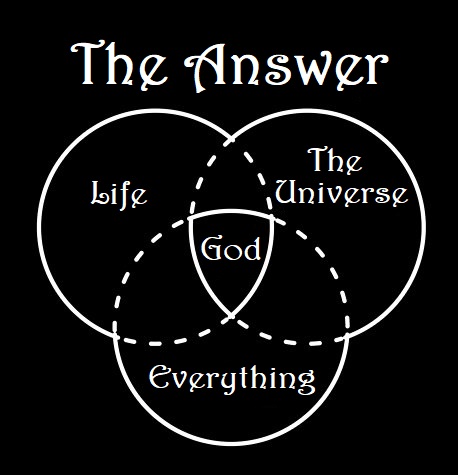The Answer
By Anthony Casperson
4-12-25
Today is my birthday. Actually, it’s the first time in the nearly nine years since I started this website that my birthday’s fallen on a Saturday. (Thanks leap year for messing that up until now.)
On top of that, it’s also my 42nd birthday. So naturally, my mind has been on The Hitchhiker’s Guide to the Galaxy, in which the answer to the ultimate question of life, the universe, and everything is 42. I’ve been joking that I’ll finally get the answer to the meaning of life. (And it is a joke. The statement, not life. I haven’t gained any significant wisdom overnight.)
In Douglas Adams’s novel, the supercomputer named Deep Thought was tasked with calculating the answer to life, the universe, and everything. And after seven and half million years, the supercomputer finally gave the answer: 42.
We also see in the sequel, called The Restaurant at the End of the Universe, that the ultimate question to life the universe and everything was, “What do you get if you multiply six times nine?” Which is 54, not 42, for those who are mathematically-challenged.
So, not only is the answer nonsensical, but it isn’t even the right answer to the question. And the question, in turn, is ridiculous considering that it’s supposed to be the ultimate question to life, the universe, and everything.
The answer and its question are meaningless because that’s kinda the point. You see, the five-part trilogy—yes, you read that right—is part of what has been labeled “Absurdist Literature.” Which is even stranger considering the fact that The Hitchhiker’s Guide to the Galaxy started out as a BBC radio drama.
Absurdist literature focuses on themes of meaninglessness and purposelessness. The meaning to life, the universe, and everything is viewed as elusive, or even impossible to understand. Therefore, the answer of life being a number that isn’t even the product of the ultimate question fits right in. We’re meant to find the absurdity of life. Witness how meaningless it all is.
The point is that there is no point. (Just as there is no spoon. Which also has no point. Unless it’s a spork, which might have three or four, depending on who makes it.)
Interestingly, the idea about creation having a meaninglessness to it can also be found in the bible. Repeated throughout the book of Ecclesiastes comes a quote from the book’s narrator, named “The Preacher.” He says, “Meaningless, meaningless, all is meaningless.” Translations might also say “Vanity of vanities, all is vanity,” But it means the same thing.
Trying to find weight and value in something as fleeting as a breath is useless.
The number of years that span this life are a mere drop in the bucket in the totality of the universe. (How big that a person pictures the bucket will differ, depending on our view of the origin of the universe. And could be more vast than the ocean, if we take eternity into mind.)
And we are but one person among how many billion people currently living on the planet. Not to mention all of those who’ve passed on before us. Tiny specks on one small, floating rock existing among unknown galaxies.
Comparing our lives to breaths might just be giving us too much credit.
But at the end of Ecclesiastes, the Preacher gives us the ultimate answer to life, the universe, and everything. And it’s not some absurd response meant to drive us to more consideration of meaninglessness. No, in Ecclesiastes 12:13, he tells us the end of the matter. The entirety of his experience in trying to find meaning in the actions of existence led him to one piece of wisdom. One thing with the weight of true meaning.
He points us to God. Our Creator. The one whose breath gave life to humanity. The one by whose word the universe exists. The one who holds everything in his hand.
God is the answer. And he is not absurd.
The Preacher tells us that the whole duty of humanity—everything that we are as human beings—is to fear God and keep his commands. In this weightless breath of a life, we should give God his proper weight and allow his words to pervade our actions.
This life—my life, these 42 years—will only find meaning in God. We’ll only find the truthfulness of Absurdist Literature, if we try to find the ultimate answer to life, the universe, and everything inside of creation.
No answer is found in creation. But meaning comes from the one who created it all.
And he gives us purpose. His purpose. So, let’s draw near to him. Hear the meaning he places in us through Christ. And stop trying to find the meaning of life anywhere else.
We already have the answer. No supercomputer necessary to find it.



